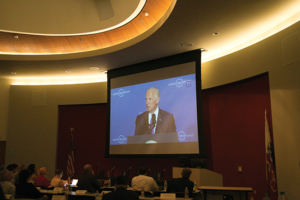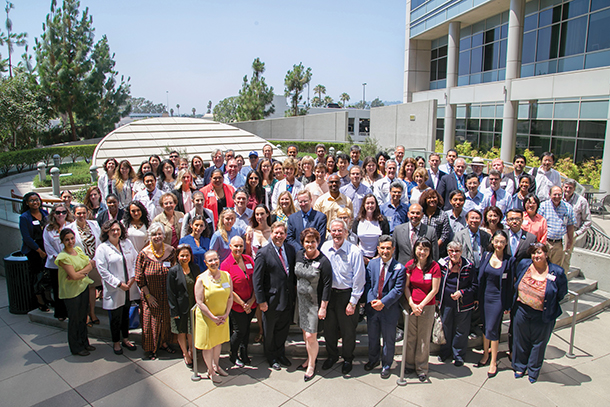The USC Norris Comprehensive Cancer Center recently hosted a satellite Cancer Moonshot Summit in conjunction with the Washington, D.C., summit hosted June 29 by U.S. Vice President Joe Biden. The event was one of many held nationwide that day, as the country unites to double the rate of progress in cancer prevention, diagnosis, treatment and care through the next five years.

Vice President Joe Biden speaks during a live broadcast of the National Cancer Moonshot Summit, held June 29 in Washington, D.C. (Photo/Ricardo Carrasco III)
More than 200 people attended the USC Norris satellite summit, held in Aresty Auditorium, with thousands more tuning in to the Facebook live stream. Participants included physicians, scientists, patients, patient advocates, philanthropists, elected officials and survivors. Hilda Solis, Los Angeles County First District Supervisor, welcomed guests to the event and expressed gratitude at having a National Cancer Institute-designated cancer center in her district.
In the spirit of the Cancer Moonshot Summit, aimed at creating action and fostering collaborations around the goals of the Cancer Moonshot, the USC Norris summit began with featured moonshot priorities at USC Norris, including the development of an annotated tissue bank and biorepository and increased investment in precision oncology in underserved populations.
Dana Dornsife, USC Trustee and founder of the Lazarex Cancer Foundation, also spoke about her organization’s work improving equitable access and increased participation in clinical trials. While USC Norris is a national leader in clinical trials and has an established record of facilitating enrollment for underrepresented minorities, even more can be done to increase clinical trial enrollment. Dornsife also announced her iMPACt iniative, which is helping to develop language for the FDA to allow for reimbursement of ancillary costs from clinical trial participation.
Jorge Nieva, MD, associate professor of clinical medicine, discussed his CancerBase project, an official Cancer Moonshot initiative involving researchers across multiple schools within the university. CancerBase is a database of cancer patients that includes not only their medical information, but also their family history, location and social profile. In doing so, patients gain access not only to clinical resources, but also support groups and resources that serve their mental and emotional needs. Peter Kuhn, PhD, professor of medicine and one of the researchers involved in this project, was in Washington, D.C., to discuss CancerBase at the Cancer Moonshot Summit hosted by Howard University.
After Biden gave his comments via satellite, attendees divided into breakout groups focused on the Adult and Young Adult Cancer Program at USC, clinical trials and community outreach or survivorship.
“It was a remarkable experience to have such a wide spectrum of community members collaborate and address obstacles in prevention and treatment with unique perspective,” said Stephen Gruber, MD, PhD, MPH, director of the USC Norris Comprehensive Cancer Center. “Everyone has been touched by cancer in some way; and this cancer moonshot initiative allows the whole nation to contribute to our efforts. The Vice President set aggressive milestones to end cancer as we know it, and by working together, we will make progress toward this goal.”
— Mary Dacuma


